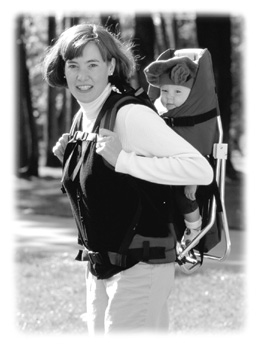IN THIS ISSUE
Care of Obese Patients Challenges Health Care Providers
Primary Care Intervention Helps Overweight Adolescents
Search for Cause of Type 2 Diabetes Continues
Researchers Investigate New Obesity-related Disease
Partnership Plans Program to Help Families Get Healthy
Task Force Welcomes New Members
Fun with Food & Fitness on FoodFit.com
Updated WIN Publication
Materials From Other Sources
Meeting Notes
WIN
NIDDK
WIN Notes is
produced by the
Weight-control
Information Network
(WIN). Questions or
comments should be
referred to the editor,
Weight-control
Information Network
1 WIN WAY
BETHESDA, MD
20892-3665
TEL (202) 828-1025
FAX (202) 828-1028
Psychosocial Factors Affect Postpartum Weight
 Weight
gain during pregnancy is not the only factor affecting postpartum changes
in body weight—so are food- and exercise-related behaviors after
pregnancy. Psychosocial factors, such as body satisfaction, social support,
and belief that one’s weight-control efforts will be successful,
influence these behaviors during the first year postpartum, according
to researchers at Cornell University in Ithaca, NY.
Weight
gain during pregnancy is not the only factor affecting postpartum changes
in body weight—so are food- and exercise-related behaviors after
pregnancy. Psychosocial factors, such as body satisfaction, social support,
and belief that one’s weight-control efforts will be successful,
influence these behaviors during the first year postpartum, according
to researchers at Cornell University in Ithaca, NY.
Pamela Hinton, Ph.D., and Christine Olson, Ph.D., R.D., followed the physical activity and eating patterns of 498 women, mostly non-Hispanic whites, during pregnancy and at 6 months and 1 year postpartum. They also looked at psychosocial variables to see what effect these factors had on diet and exercise patterns. The researchers found that self-efficacy, or belief in one’s ability to make behavioral changes, was clearly linked to increased physical activity and reduced food intake.
Women who experienced more weight control self-efficacy, exercise self-efficacy, social support, body satisfaction, and positive feelings about motherhood reported being physically active more often than other women. They also participated in a greater variety of activities, ranging from brisk walking, household chores, and yard work, to more formal exercise such as jogging or swimming. Women said they exercised more if their husbands did. More active women also reported eating less.
Body satisfaction, weight gain acceptance, and a drive for thinness characterized women who ate less. Food intake self-efficacy, or eating healthful foods and avoiding overeating, also played an important role in returning to pre-pregnancy weight.
Health care providers can help their postpartum clients reach a healthy weight by addressing psychosocial influences on eating and physical activity behaviors after pregnancy. For example, providers can help clients set behavioral goals, educate them about the benefits of exercise and good nutrition, and help them identify and overcome barriers to physical activity and healthy eating.
This study, supported by a grant from the National Institutes of Health (NIH), is published in the December 2001 issue of the Journal of the American Dietetic Association. s